S&P’s latest position places Nigeria on a stronger footing ahead of future reviews and sends a positive message to global investors assessing opportunities in Africa’s largest economy.
Business
FG Clarifies $5bn Aramco Loan Status
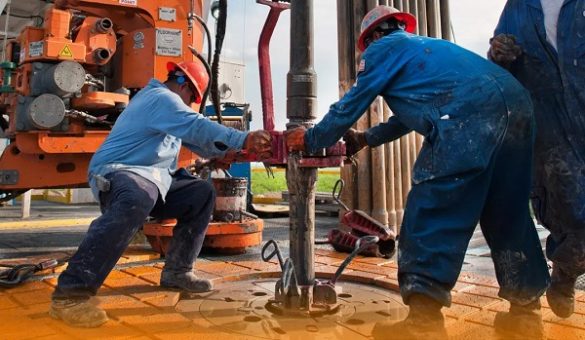
Amid ongoing conversations around a proposed crude-for-loan arrangement with Saudi oil giant Aramco, the federal government says it remains committed to deploying innovative and fiscally responsible financing strategies to optimise Nigeria’s oil assets, enhance external liquidity, and strengthen macroeconomic stability.
In a statement issued on Wednesday, the Federal Ministry of Finance addressed recent media reports suggesting that discussions over a $5 billion oil-backed loan deal with Aramco may have collapsed. The ministry stated that no final decision has been taken on the matter and urged the public to disregard speculations about the status of the negotiations.
“While market speculation is not uncommon in the context of ongoing economic reforms and transactions, no final decision has been announced by the Government, and commentary suggesting the collapse of any such initiative is unfounded,” the ministry said.
This clarification follows a report earlier in the week by Reuters, which indicated that the proposed oil-for-loan deal between Nigeria and Aramco had stalled. The report, citing four unnamed sources, said the deal was experiencing delays due to a recent downturn in global crude oil prices, which had raised concerns among prospective financiers.
According to the report, the deal, potentially Nigeria’s largest oil-backed loan, would have been the first of its kind involving Aramco at such a scale in the country. However, the sharp drop in global oil prices, along with evolving market indices, reportedly dampened interest among Gulf and African banks expected to co-fund the facility.
The proposed $5 billion loan is part of President Bola Tinubu’s broader external borrowing strategy, which includes a recent request to the National Assembly for approval to borrow $21.5 billion to support the 2024 budget. Sources familiar with the deal said President Tinubu first initiated talks during a bilateral meeting with Saudi Crown Prince Mohammed bin Salman in Riyadh at the Saudi-African Summit in November 2023.
As part of the loan terms, Nigeria would be required to allocate at least 100,000 barrels of crude oil per day to back the facility. However, oil price volatility and output constraints are reportedly complicating the structure of the arrangement.
Bonny Light, Nigeria’s flagship crude blend, is currently trading at around $78 per barrel, slightly above the $75 per barrel benchmark in the 2024 federal budget. Despite this, actual production remains below target. The May report from the Organisation of Petroleum Exporting Countries (OPEC) shows Nigeria produced just under 1.5 million barrels per day (bpd) in April, falling short of the 2 million bpd budgeted output.
Years of underinvestment in the oil sector have hindered Nigeria’s ability to ramp up production. At the same time, the country is using a significant portion of its oil output, estimated at 300,000 bpd, to service existing oil-backed loans, primarily through the Nigerian National Petroleum Company Limited (NNPC Ltd). While one of these facilities is expected to be paid off this month, lower oil prices mean Nigeria may need to allocate more barrels for debt servicing, which in turn affects its capacity to secure new deals.
The slow progress in the Aramco discussions is also attributed to concerns from participating banks over delivery commitments. Some of the lenders involved — said to include Gulf banks and at least one African financial institution — reportedly fear there may not be enough crude available to meet the loan terms due to existing obligations and rising joint-venture costs.
To address production shortfalls and increase oil revenue, the federal government has issued executive orders aimed at lowering production costs and incentivising upstream investments.
These efforts are part of a broader push to stabilise the country’s fiscal outlook amid mounting budgetary needs and global market headwinds.
Despite the current challenges, the federal government maintains that its financing decisions will remain anchored on transparency, accountability, and the effective utilisation of the country’s oil resources.
Thenationonlineng.net
Business
2025 Net Worth: Meet Nigerian Billionaire Who Has Made More Money Than Aliko Dangote
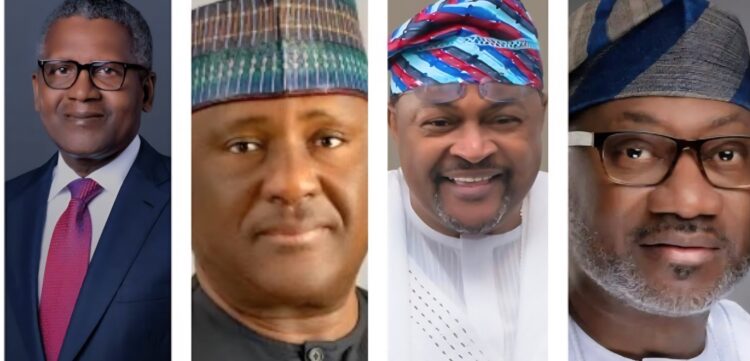
Abdulsamad Rabiu, the founder of BUA Group, has emerged as the fastest-growing African billionaire in 2025.
His wealth rise in 2025 is higher than Africa’s richest man, Aliko Dangote and other African billionaires.
According to the latest data from the Bloomberg index, Rabiu’s net worth has increased by $5.25 billion in 2025, bringing his total net worth to $8.4 billion as of Friday, November 14.
In comparison, Dangote who has a total net worth of $29.8 billion, has gained $1.75 billion from January to November 14, 2025.
The increase in Rabiu’s wealth is thanks to the performance of his key assets on the Nigerian Exchange: BUA Cement and BUA Foods, two of the largest companies in the country.
However, Dangote remains Africa’s wealthiest individual for total net worth
A Lagos-based financial analyst, Kelvin Umeni, said: “Rabiu’s companies have been performing strongly. If you check the half-year results of his two companies, you will realize he is doing very well. I am not surprised, and I expect him to hit a $10 billion net worth soon.”
Other African billionaires on the Bloomberg billionaire index have also recorded impressive gains this year but not at the same pace with Rabiu.
Johann Rupert, Africa’s second-richest man, has a total net worth of $18.4 billion as at Friday, an increase of $4.79 billion from the start of the year. His wealth is driven by stakes in Richemont.
Nicky Oppenheimer, another South African billionaire known for his holdings in De Beers, has gained $2.18 billion so far in 2025, bringing his wealth to $13.7 billion. While Egyptian billionaire Naguib Sawiris wealth totals $10.1 billion, which is a YTD increase of $3.23 billion.
His fellow countryman, Nassef Sawiris net worth currently stands at $9.42 billion, a $727 million growth in 2025.
South African entrepreneur Natie Kirsh fortune has increased by $530 million, taking his total net worth to $9.86 billion.
It is important to note that Dangote remains Africa’s richest man by a distance, but for wealth gain in 2025, Abdulsamad Rabiu is the rising star.
Business
CBN Gov Welcomes S&P’s Upgrade Of Nigeria’s Outlook To Positive
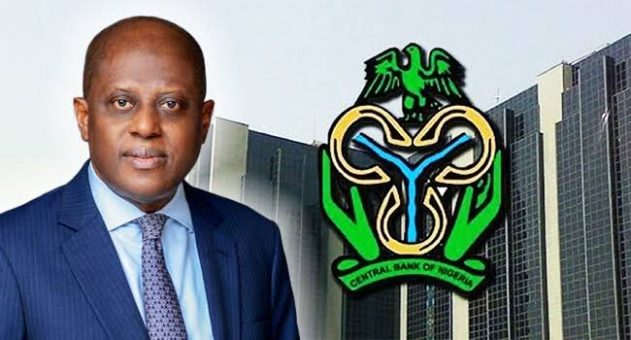
The Central Bank of Nigeria (CBN) Governor, Olayemi Cardoso, has welcomed the decision of S&P Global Ratings to revise Nigeria’s outlook to “positive” from “stable,” describing it as a signal that reforms in the financial system are gaining traction.
S&P announced the upgrade on Friday citing improving policy coordination, strengthened monetary management and steps taken to restore confidence in the Nigerian economy.
The revision shows that Nigeria is now viewed as having a better chance of achieving stronger credit fundamentals over the medium term. This means S&P now sees Nigeria as more likely to strengthen its economic and financial stability in the coming years, based on recent policy improvements.
In practical terms, the agency believes the country has a stronger chance of earning a future credit rating upgrade if current reforms are sustained.
Speaking at a strategic session in Abuja, Cardoso said the development reflects the steady progress recorded in stabilizing key economic indicators since the beginning of the year.
According to him: “This is encouraging news for the country. It shows that our efforts to restore stability, strengthen governance frameworks and rebuild trust in the financial system are being recognized internationally.”
The Governor noted the CBN’s actions—ranging from tighter monetary policies to enhanced foreign exchange market operations—have contributed to clearer market signals and better investor confidence.
“The Central Bank has brought stability to the economy and become a beacon of hope,” he stated.
Cardoso added that the improved outlook should motivate both public and private sector stakeholders to sustain ongoing reforms that support growth, investment, and long-term macroeconomic resilience.
Business
Nigeria Targets ₦160bn From Wheat Production
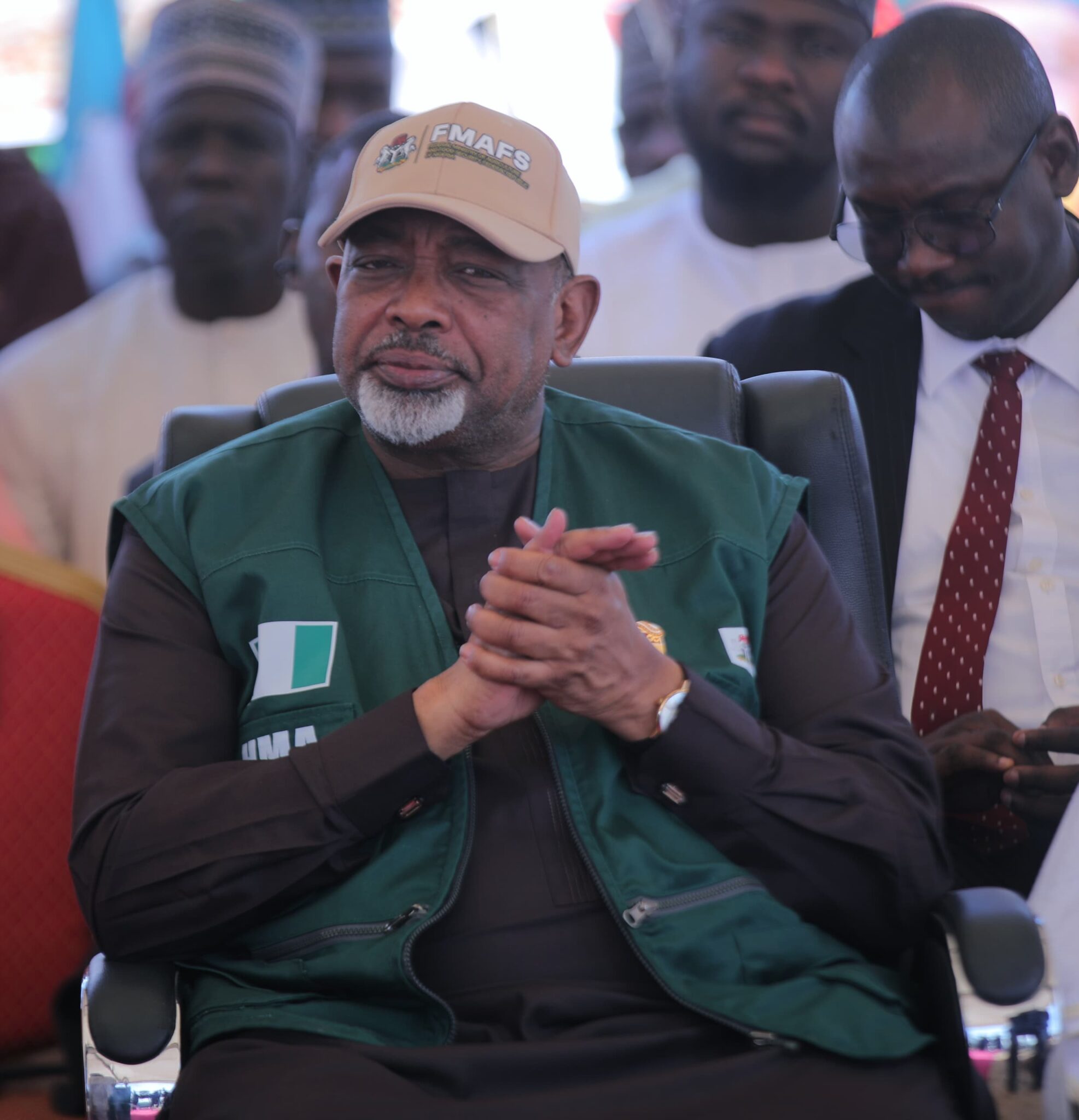
The Federal Government on Saturday said it has earmarked 40,000 hectares of land for 2025/2026 dry season wheat production and registered 80,000 farmers, with an expected output value of approximately ₦160 billion.
The Minister of Agriculture and Food Security, Abubakar Kyari, disclosed this during the official flag-off of the 2025/2026 dry season wheat production programme under the National Agricultural Growth and Agro Pocket Project (NAGSAP) in Jere Local Government Area of Borno State.
Speaking at the ceremony, the minister said that out of the 40,000 hectares earmarked for wheat production this dry season, 3,000 hectares have been allocated to Borno State, representing 6,000 registered wheat farmers.
He said: “Under the 2023/2024 dry season wheat production programme, a total of 107,429 registered farmers were supported with critical subsidized inputs, resulting in an output valued at ₦474,628,000 billion. During the 2024/2025 dry season, 279,297 registered farmers received support, with an output valued at ₦893,750,004 billion.
“For the current 2025/2026 season, the programme is targeting 80,000 registered farmers with an expected output value of approximately ₦160 billion.”
Kyari emphasized that the NAGSAP programme will deploy Agricultural Extension Agents to guide farmers on modern agronomic practices and provide continuous field-level advisory services.
“In addition, Fertiliser and Seed Quality Control Officers will be mobilised to ensure that all inputs delivered to farmers meet the required standards, thereby guaranteeing higher productivity and improved yields,” Kyari added.
According to him, the wheat component of the NAGSAP programme covers sixteen states of the federation.
“These are Adamawa, Bauchi, Borno, Cross River, Gombe, Kaduna, Kano, Kebbi, Niger, Plateau, Sokoto, Taraba, Yobe, and Zamfara. The inclusion of Cross River last year expanded wheat production into the southern region for the first time and strengthened our national capacity to diversify production across ecological zones,” he said.
Kyari noted that the project is designed to include women and young people, enabling them to access training and agricultural opportunities.
“NAGSAP is deliberately designed to leave no one behind. The program ensures that farmers across communities—including women and young people, who play vital roles in our agricultural workforce—have equitable access to inputs, training, and opportunities.
“The success of any agricultural season depends on the quality of inputs that reach our farmers. Without certified seeds, accurate fertilizer blends, and timely access to crop protection products, no level of effort in the field can deliver the yields we require as a nation. This is why NAGSAP places strong emphasis on input quality, traceability, and transparent delivery systems, ensuring that every farmer receives the right inputs at the right time to achieve higher productivity and better returns,” he said.
Also speaking, the Governor of Borno State, Babagana Zulum, applauded the Federal Government for its continuous support towards irrigation development.
“Mr President’s commitment to food security and national productivity provides the foundation upon which programs like this are built,” he stated.
According to him, Borno State, with its vast arable and irrigable land—especially within the Lake Chad Basin—remains one of Nigeria’s most promising agricultural frontiers.
He said: “Today is more than a ceremony; it is a celebration of hope, resilience, and our unwavering commitment to ensuring that no family in Borno State goes hungry and no farmer is left behind. Despite the challenges of displacement, insecurity, and climate shocks, Borno State remains steadfast in growing its own food and empowering its people.”
The governor reaffirmed his administration’s commitment to sustaining all-season farming through the provision of essential infrastructure, logistics, modern machinery, improved seeds, fertilizers, agrochemicals, and other inputs required to boost productivity and support farmers across the state.
“Here in Borno State, wheat cultivation is not just a program; it is a transformative initiative. Through targeted investments in irrigation, mechanization, quality inputs, and extension services, we are equipping farmers to achieve higher yields, enhance productivity, and contribute meaningfully to national output.”
He further stated: “Borno State has achieved remarkable milestones under our people-centered agricultural vision. Our input support programmed have reached tens of thousands of smallholder farmers, resettled households, women, and youth, providing improved seeds, agrochemicals, and agronomic guidance.”
-
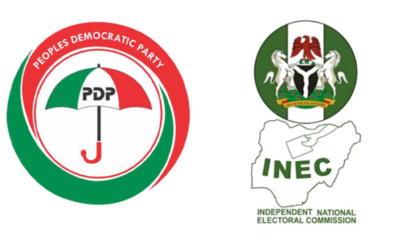
 Politics2 days ago
Politics2 days agoINEC Rejects Mohammed As PDP Acting Chairman
-
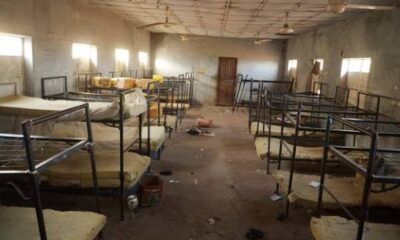
 News2 days ago
News2 days agoNames Of Kidnapped Kebbi School Girls Released
-
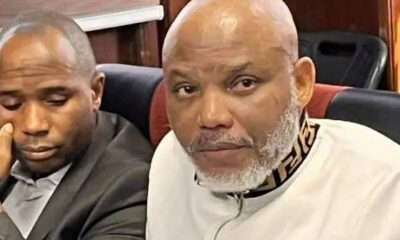
 News1 day ago
News1 day agoJudge Declares Nnamdi Kanu An ‘International Terrorist’
-

 News1 day ago
News1 day agoNAF Launch Fresh Airstrikes On Terrorists Hideout In Sambisa Forest
-
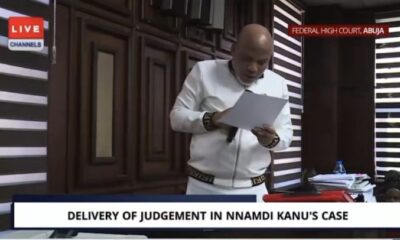
 News1 day ago
News1 day agoCourt Finally Delivers Judgement In Nnamdi Kanu’s Terrorism Case
-
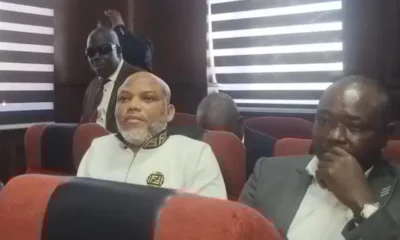
 News1 day ago
News1 day agoJust In: FG Urges Court To Impose Death Sentence On Nnamdi Kanu
-
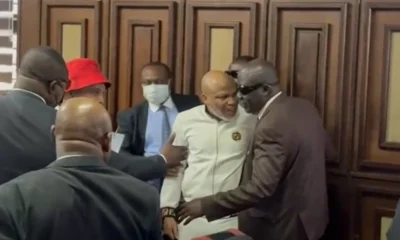
 News23 hours ago
News23 hours agoBREAKING: Court Sentences Nnamdi Kanu To Life Imprisonment



